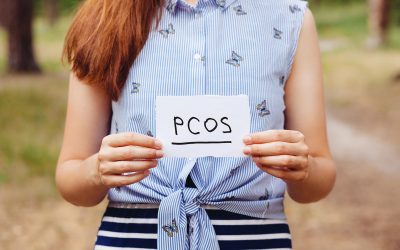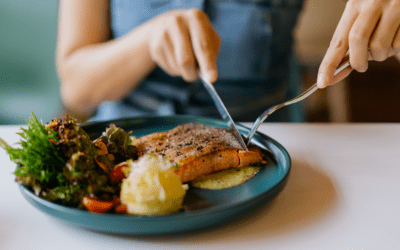By, Chelsea Fechtner, MScN, CN
The short answer: it depends!
Polycystic ovary syndrome (PCOS) is the most common endocrine disorder in reproductive women, affecting nearly 10% in this age range. PCOS can cause symptoms like acne, unwanted body hair growth, scalp hair thinning, weight gain, insulin resistance, inflammation and disordered eating. Dairy is a controversial topic when it comes to PCOS, and you may be wondering if you have to cut it out of your diet in order to alleviate your PCOS symptoms. Here are a few considerations to make when choosing dairy products and ultimately deciding whether they have a place in your diet.
Is Dairy Healthy for Me?
You probably grew up hearing that you must drink three glasses of milk every day to have strong bones. While, dairy products are certainly not an essential piece of the diet, they do provide a good source of calcium, vitamin D, protein and iodine. However, those with dairy allergies or lactose intolerance can experience unpleasant symptoms after consuming dairy and might feel best avoiding it altogether. A dairy allergy involves the immune system and is often a result of an allergic reaction to either the casein or whey proteins. With lactose intolerance, dairy can cause abdominal cramping and other gastrointestinal symptoms. Experts estimate that 68% of the population have a reduced ability to digest lactose after infancy.
Type & Fat Content Matter
If you don’t suffer from lactose intolerance or a dairy allergy and are choosing to include dairy in your diet, full-fat dairy products have been shown to be more favorable for fertility and PCOS than low-fat and fat-free dairy products, due to the positive effect that the higher fat content has on blood sugar regulation (2,3). Along with fat content, the type of dairy is important to consider. Fermented dairy products like yogurt have been shown to improve insulin sensitivity and reduce the risk of type 2 diabetes (3). Cheese has also been shown to have more of a positive impact on insulin than other dairy products and hard, aged cheeses like parmesan and pecorino are lower in lactose, making them more tolerable for those with a lactose intolerance (4). Note that a serving of cheese is about one ounce, which is much smaller than what’s added to a typical bowl of mac and cheese. Instead, try using cheese as a condiment on your meal rather than making it the main event.
Dairy & PCOS
Unfortunately, studies on the connection between PCOS and dairy alone are limited, and more research is needed. An 8-week dietary intervention study looked at the impact of a low-starch/low-dairy diet on overweight and obese women with PCOS (4). Participants were instructed to eat lean animal protein, fish and shellfish, eggs, non-starchy vegetables, low-sugar fruits, avocados, olives, nuts, seeds, oils and could also have up to one ounce of full-fat cheese per day. The women in the study experienced weight loss, improved insulin sensitivity and reduced testosterone. These results are significant and show that limiting foods that elevate insulin, such as low-fat dairy and starchy carbohydrates, can have positive effects on PCOS symptoms. We also know that there is a relationship between low-fat milk and an increase in insulin like growth factor 1 (IGF-1), androgen production, acne and reduced insulin sensitivity. If you do choose to eat dairy, full-fat dairy products in moderation, especially low-glycemic dairy products like cheese, will be more supportive for PCOS symptom management.
Dairy & Inflammation
Dairy products have been shown to have anti-inflammatory effects in healthy individuals, especially full-fat dairy and fermented dairy products (1). However, dairy can have pro-inflammatory effects for those that have a dairy allergy or intolerance (1). If you are experiencing digestive symptoms after eating dairy, it could be a sign that dairy is causing inflammation in your body, and you might want to consider cutting it out for a few weeks to see how you feel.
Tips for Navigating the Dairy Dilemma
- Choose organic full-fat dairy products over low-fat dairy, emphasizing those with a lower effect on insulin (cheese and yogurt).
- Focus on probiotic-rich sources of dairy like yogurt and kefir. Be sure to check the nutrition label aim for low-sugar options, ideally 10g or less per serving.
- Take note of your symptoms. Do you notice digestive symptoms like bloating, diarrhea, constipation or cramping after you eat dairy? If so, it could be helpful to cut it out for a few weeks to see how you feel.
- If you decide that dairy isn’t working for you, try adding in other calcium food sources like tahini, chia seeds, almonds, sardines, dark leafy greens and tofu.
- When in doubt, get support! If you’d like more support around dairy and whether it fits into your diet, reach out and schedule a nutrition and wellness appointment!
References:
- Bordoni, A., Danesi, F., Dardevet, D., Dupont, D., Fernandez, A., Gille, D., Nunes dos Santos, C., Pinto, P., Re, R., Rémond, D., Shahar, D. and Vergères, G., 2017. Dairy products and inflammation: A review of the clinical evidence. Critical Reviews in Food Science and Nutrition, [online] 57(12), pp.2497-2525. Available at: https://www.tandfonline.com/doi/full/10.1080/10408398.2014.967385 [Accessed 17 September 2021].
- Chavarro, J., Rich-Edwards, J., Rosner, B. and Willett, W., 2007. A prospective study of dairy foods intake and anovulatory infertility. Human Reproduction, [online] 22(5), pp.1340-1347. Available at: https://academic.oup.com/humrep/article/22/5/1340/2914869?login=true [Accessed 17 September 2021].
- Janiszewska, J., Ostrowska, J. and Szostak-Węgierek, D., 2020. Milk and Dairy Products and Their Impact on Carbohydrate Metabolism and Fertility—A Potential Role in the Diet of Women with Polycystic Ovary Syndrome. Nutrients, [online] 12(11), p.3491. Available at: https://www.ncbi.nlm.nih.gov/pmc/articles/PMC7696580/ [Accessed 17 September 2021].
- Phy Ali M, J., 2015. Low Starch/Low Dairy Diet Results in Successful Treatment of Obesity and Co- Morbidities Linked to Polycystic Ovary Syndrome (PCOS). Journal of Obesity & Weight Loss Therapy, [online] 05(02). Available at: https://www.ncbi.nlm.nih.gov/pmc/articles/PMC4516387/ [Accessed 17 September 2021].
- Rajaeieh, G., Marasi, M., Shahshahan, Z., Hassanbeigi, F. and Morteza Safavi, S., 2014. The Relationship between Intake of Dairy Products and Polycystic Ovary Syndrome in Women Who Referred to Isfahan University of Medical Science Clinics in 2013. International Journal of Preventative Medicine, [online] 5(6), pp.687-694. Available at: <https://www.ncbi.nlm.nih.gov/pmc/articles/PMC4085920/> [Accessed 27 September 2021].




